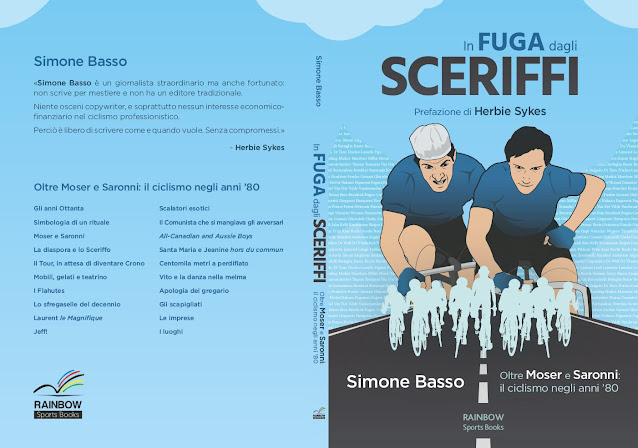In fuga dagli Sceriffi -- Preface by Herbie Sykes
IN FUGA DAGLI SCERIFFI
Oltre Moser e Saronni: il ciclismo negli anni '80
Rainbow Sports Books
by Herbie Sykes
I first met Simone Basso at the 1999 Giro d’Italia. He turned up wearing an old Système U jersey in deference to Laurent Fignon, and he saw Pantanismo for what it was. Simone, who seldom forgets anything, had forgotten more about cycling than I would ever know, and he alone refused to subscribe to this pandemic of catholic idiocy. This was the age of Epo and Pantani, brilliant climber or otherwise, had a very low natural haematocrit. He was an extremely good rider, but ultimately nought but a clown. He’d neither the intellect nor the emotional ballast to cope with the circus they were building around him, and how could he? A needy, cloying media, a delirious and deluded public in need of a sporting David, all those classical Italian sporting tropes…
In 2005 I started work on a book about the Giro, and through it I met a Torinese girl. I moved in with her, became a writer of sorts, and over the years Simone and I became good friends. As such I would read the stuff he blogged assiduously, but also quite jealously. I was making my living from writing about cycling, but as regards ability, knowledge and breadth of understanding there was a chasm between his stuff and mine.
I think Simone Basso is a very special writer, but also a very lucky one. By that I mean that he doesn’t do it for a living, and he has no “traditional” publisher. He has no salacious copy editor, and better still he has precisely no financial interest in the world of professional cycling. Thus (and here’s the crux of it) he’s at liberty to write whatever and whenever he sees fit, and to do so without journalistic or stylistic compromise.
In 2011 he took it upon himself to write this, a small book about cycling. He tells me he completed it in two short months, and it was implicit that it wasn’t written to satisfy some stolid commercial imperative. Rather it was written because he felt like it and because, given that he’s possessed of a ferocious intellect and a photographic memory, he could.
In 2016 I persuaded him to loan me this manuscript. He acquiesced, but insisted that the book had been written for fun as distinct to publication. That was all fine and well, excepting that it’s like no other cycling book I’ve ever read. At root it’s an examination of cycling in the eighties, with the mythical Francesco Moser-Giuseppe Saronni rivalry at its narrative core. Uniquely, however, it frames the sport and its constituents in a wider, European social context. It traces its evolution from a sporting-commercial entity into a popular cultural phenomenon, and in so doing offers a genuinely unique take on professional bike racing. It’s also extremely funny, and cycling – Heaven forbid – has never has a funny book.
Having read it, I felt compelled to translate some of it into English. Cycling is quite fashionable in Britain right now, and I’d an idea I might just find a publisher willing to take it on. In the event they turned it down not because the book isn’t very good, but because it’s simply too other. Cycling is the most worthy of all sports, and its constituents are by some distance the most narcissistic. They like to hawk themselves itself as, in some way, “heroic”, as if the act of racing a bike induces some higher metaphysical value system. This is a sport which has spent the best part of a century gazing at its naval, whose central tenets seem to be misery and piety. Therein lies the essential paradox because, if ever a sport was given to pathos, it’s bike racing.
Anyway it seems the last thing it needs is intelligible, objective, critical literature. I guess I ought to have known that, because if it had need of decent writers it would have some by now. Instead it has hacks like me, and an unending slew of mindless hagiographies to famous cyclists. Sports books, it seems, are always judged by the (name on the) cover, and they get made for one reason and one reason only. They’re made to be sold, and if people happen to read them then so much the better. The fact Simone’s didn’t speaks volumes for it, but also for the paucity and intellectual torpor of sports publishing industry.
So fuck ’em.
Enjoy the ride…
Herbie Sykes
Turin, May 2019



Commenti
Posta un commento